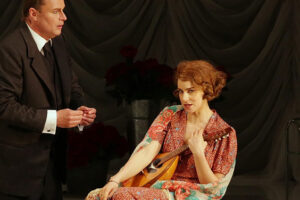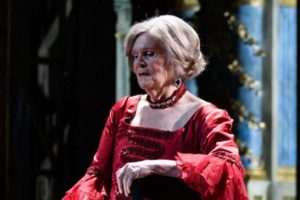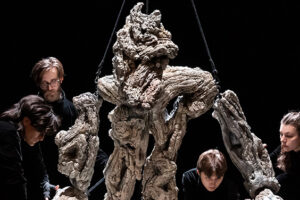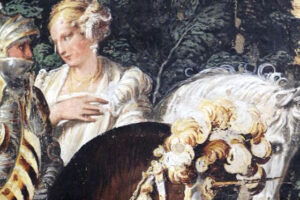
The 19th century could not cope with Così fan tutte, ossia La scuola degli amanti (Thus Do They All, or The School for Lovers) with a libretto by Lorenzo da Ponte and music by Mozart, first presented in Vienna in 1790. Beethoven’s only opera has the ideal of feminine fidelity in the very title. Wagner’s heroines are going to remain faithful to their men until death, or even through all eternity. In Cosi fan tutte, the two sisters cannot stay faithful to their sweethearts for a single day.
Although Cosi was enjoying an apparently successful run before the theatres in Vienna were closed for court mourning owing to the death of the Emperor Joseph II, already by 1791 a response to the first production in Frankfurt called the opera “a miserable Italian product with the powerful, sublime music of a Mozart.” Complete rewritings of the libretto with an entirely different text were frequent. In 1821 Covent Garden presented Tit for Tat, or, the Tables Turned,altered and adapted from Così fan tutte.
In 1837 an opera called Die Guerillas was presented in Frankfurt, with the music of Cosi fan tutte fitted to a completely different libretto about bandits attacking a Spanish castle, and in 1863 Paris saw Peines d’amour perdues, with music from Cosi applied to a new text based on Shakespeare’s Love’s Labours Lost. It was not until 1922 that Così fan tutte was first performed in the USA (at the Met) and only since the 1950’s and 60’s has the opera been part of the standard operatic repertory.
A philosophical gentlemen bets his two young soldier friends that their sweethearts cannot remain faithful to them for a single day. The two soldiers, in disguise, woo each others’ girlfriend, and, helped by the urgings of their pert housemaid, the two girls have signed marriage contracts with their new suitors by evening. This rather artificial comedy, somewhat similar in tone and content to works by Laclos or Marivaux, called forth from Mozart not only the expected buffo arias and hectic comic ensembles, but also sublime music of transcendent beauty and an emotional quality, especially in the second act, almost too deeply felt for such a slight story. The opera is quite long and it is rarely performed note complete, with standard cuts in the secco recitative, and passages from the many ensembles and even entire arias commonly being excised.
This set of three CD’s from Deutsche Grammophon was recorded at live concert performances from the Baden-Baden festival last year. The sound is excellent, with no audience noises bar the occasional slight titter. The star of this recording is definitely the conductor, Yannick Nézet-Séguin, who leads a performance fizzing with energy from the get-go, bringing out the many incidental beauties of the orchestration throughout the piece. The Chamber Orchestra of Europe, although performing on modern instruments, are clearly influenced by historically informed practice, with superb bite from the brass instruments.
The few contributions of the chorus in this opera are excellently performed by Vocalensemble Rastatt. The march in Act One, “Bella vita militar”, with chorus, brass and percussion was so wonderfully performed that I had to listen to it three times in a row. A fortepiano is used for the secco recitatives and plays continuo throughout, very acceptable.
If the soloists in this recording were on the level of the conductor, orchestra and chorus, this would be a Cosi for the ages. Unfortunately, the singers deliver uncharacterized and rather bland performances. For instance, the showpiece recitative and aria for Fiordiligi, “Come scoglio”, is full of huge leaps from top notes to low ones, surely intended to create a rather comic effect of Outraged Virtue protesting too much at the idea of deserting her true love. Critic William Mann quotes Mozart saying that he wrote those leaps in because the original singer, Adriana Ferrarese del Bene (da Ponte’s girlfriend), known for her wide range, had the habit of dropping her chin on low notes and raising her head on high ones, and Mozart wanted to make her “bob like a chicken” onstage.
There is nothing of this in Miah Persson‘s performance of the aria. The leaps and elaborate roulades are competently managed as if they are no big deal. Persson does not manage to sing her contributions to the “farewell” quintet or trio in Act One with the sort of melting beauty I like to hear in those passages. The role of Fiordiligi is a huge one, and I started to find listening to so much mildly pleasant but generic singing in Act Two rather wearing.
Angela Brower as her sister Dorabella similarly sings nicely, but blandly, without making much of an effect. It is hard at times to tell the two sisters’ voices apart. I found Mojca Erdmann‘s performance as the maid Despina very irritating, a bright, hard timbre chirping away most of the time, but with horrendous interpolations of stratospheric and out of tune high notes in her disguise as the doctor in the Act One finale. I suppose someone thought it was funny, although it just made me wince, not laugh, but then she does much the same thing again in the little aria in Act Two “Una donna a quindici anni.” Horrible!
Rolando Villazón sings this music in a more Latinate style than we are accustomed to, I cannot say I really enjoyed the “catch in the throat” sob type effects and glottal stops very much. He does manage some lovely soft singing in “Un’aura amorosa” but pushes his voice too much for my taste in the more forceful “Tradito, schernito”. His bravura aria, “Ah, lo veggio,” is cut.
Adam Plachetka as Guglielmo reveals an attractive dark-timbred bass-baritone but again sings without much character. In his bitterly comic aria in Act Two, “Donne mie, la fate a tanti”, the orchestra outacts the singer, capturing the changing moods of the piece much more than Plachetka does.
As Don Alfonso, the light voiced-buffo Alessandro Corbelli, more a baritone than a bass, does not manage to create a distinctive character through either music or text. All of these singers are better in the opera’s many ensembles, performed with precision and high levels of musicianship, than they are in their solos.
I like hearing Mozart on period instruments, and for that reason my favourite CD of Così fan tutte is the one with René Jacobs conducting the Concerto Köln with Véronique Gens as Fiordiligi. Of the more classic recordings on modern instruments, in my opinion the incomparable trio of Montserrat Caballé, Janet Baker and Ileana Cotruba? in the ladies’ roles on the Colin Davis recording
cannot be beaten, with the added attraction of beautiful singing from Nicolai Gedda and a very characterful performance from Thomas Allen.

























Comments